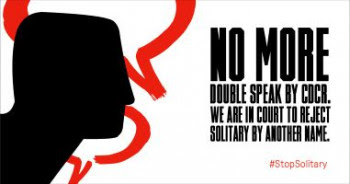Extends Settlement to End Indefinite Solitary Confinement in California
January 28, 2019, Eureka – Late Friday, a federal judge found that the California Department of Corrections and Rehabilitation (CDCR) is systemically violating the due process rights of prisoners. The judge ruled that CDCR is violating the Constitution by repeatedly relying on unreliable and even fabricated confidential information to send California prisoners to solitary confinement. The court also found CDCR is using constitutionally flawed gang validations to deny people in prison a fair opportunity for parole.
Read Court’s Decision here (Jan 25, 2019): https://prisonerhungerstrikesolidarity.wordpress.com/wp-content/uploads/2019/01/order-granting-extension-motion.pdf
As a result of evidence submitted by the prisoners’ legal team, the judge extended by one year the terms of an historic settlement agreement to end indefinite solitary confinement in California prisons, including a provision allowing monitoring by plaintiffs’ counsel.
“The purpose of the settlement was to eradicate constitutional violations related to CDCR’s use of solitary confinement. Unfortunately, California is still violating our clients’ fundamental rights to due process. This ruling is an opportunity to remedy those continuing violations,” said Senior Staff Attorney at the Center for Constitutional Rights Rachel Meeropol. “It also sends a clear message to CDCR and California’s new governor: until the constitutional violations end, the courts will be watching.”
Under a 2015 landmark agreement, nearly 1600 prisoners were released from isolated Security Housing Units (SHU) and CDCR agreed to substantially reform the process by which prisoners were placed and held in the SHU. Prisoners are no longer sent to SHU based solely on gang affiliation—often established on the basis of extremely insubstantial evidence—but only due to specific and serious rules violations.
The judge’s decision underscored the serious problems in California’s old gang validation system and the way it continues to impact prisoners:
“Plaintiffs have provided the court with ample evidentiary examples that demonstrate that the CDCR’s old process for gang validation was constitutionally infirm (for example, because CDCR’s interpretation of the word ‘activity’ also included something described as, ‘non-action piece[s] of evidence’). As a result, prisoners’ validations were sometimes based on as little as . . . having received correspondence (regardless of the content) or artwork, a birthday card, or other possessions from a validated gang member . . . or for the artwork they possessed (such as art containing Aztec or Mayan images). . . Plaintiffs also provide evidence from a number of class members’ parole transcripts in support of the contention that gang validation is a highly significant, if not often a dispositive factor in parole consideration, and that when prisoners dispute their validation at their parole hearings, Commissioners consider the challenge itself to constitute evidence of dishonesty and a manifestation of a lack of remorse or credibility.”
“Now that a judge has determined that California’s gang validation system is deeply flawed, the Parole Board must immediately stop relying on these old validations and give our clients a fair chance to earn release,” said Carol Strickman of Legal Services for Prisoners with Children.
The judge’s decision also focused on how California distorts confidential information, describing one disciplinary case where “the potentially exculpatory part of the [confidential informant’s] account was never disclosed, and instead it appears to have been replaced by an inculpating statement that the [confidential informant] never uttered;” another case where a “prisoner was told that the evidence against him included two confidential sources . . . however, according to the underlying confidential memorandum, there were not two sources, there was only one, and that person stated that he did not witness the event in question;” and many more, leading the judge to conclude that “time and again, the shield of confidentiality for informants and their confidential accounts is used to effectively deny class members any meaningful opportunity to participate in their disciplinary hearings.”
Lead counsel at the Center for Constitutional Rights, Jules Lobel, explained, “CDCR relies extensively on confidential in-custody informants, even though the California legislature and experts around the country recognize they are often unreliable. We hope this decision will provide momentum for California and other state prison systems to take steps to ensure that this type of unreliable evidence is not used to send people in prison to solitary confinement.
Ashker v. Governor of California was originally filed by prisoners who had been isolated in the SHU for more than a decade based on alleged gang affiliation. The lawsuit followed coordinated hunger strikes in 2011 and 2013 by over 30,000 prisoners statewide. On the third anniversary of the settlement agreement, former SHU prisoners published a statement marking their progress and highlighting work that remains in order to fully remedy their unconstitutional conditions.
The Ashker plaintiffs are represented by the Center for Constitutional Rights, Legal Services for Prisoners with Children, California Prison Focus, Siegel & Yee, Weil Gotshal & Manges LLP, Bremer Law GroupPLLC, Ellenberg & Hull, and the Law Offices of Charles Carbone.
Read the magistrate judge’s decision here.
Original post: https://ccrjustice.org/home/press-center/press-releases/court-finds-systemic-constitutional-violations-california
For more information, visit the Center for Constitutional Rights’ case page.
The Center for Constitutional Rights works with communities under threat to fight for justice and liberation through litigation, advocacy, and strategic communications. Since 1966, The Center for Constitutional Rights has taken on oppressive systems of power, including structural racism, gender oppression, economic inequity, and governmental overreach. Learn more at ccrjustice.org.


